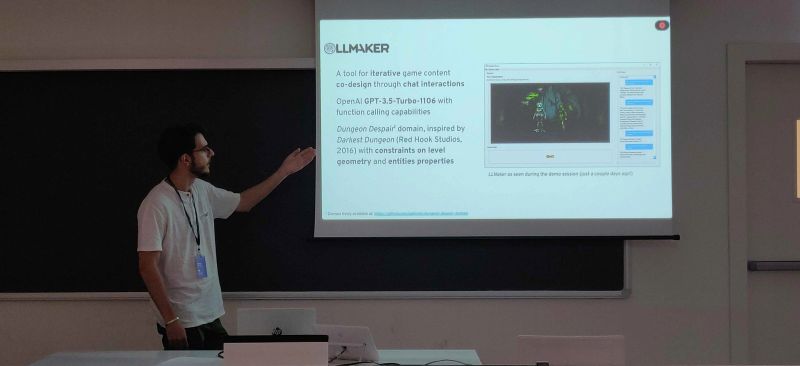
Research in Generative AI for Games presented at IEEE Conference


Roberto Gallotta and Marvin Zammit premiered demos they have developed where games leverage Generative AI and Large Language Models for generating game content (with or without a designer in the loop) at the IEEE Conference on Games which took place in Milan this year.
Large Language Models (LLMs) in games
Roberto Gallotta premiered LLMAKER, a game design interface where the designer defines the content of a game using only a chat-based interface. The demonstration was coupled with a short paper on the technical details of controlling game descriptions using natural language in a way that ensures that all content remains valid and matches the designer's wishes.
Marvin Zammit presented the first demonstration of CrawLLM, a game where the graphics, story, and antagonists are defined by an underlying generated theme and instantiated by Large Language Models (for text) and Diffusion Models (for sprites).
Human-AI Interaction Through Play workshop
Antonios Liapis co-organized the 2nd workshop on Human-AI Interaction Through Play which led to interesting discussions around Dynamic Difficulty Adjustment, relationships between real players and virtual players, and the cringe aesthetic of AI that imitates human behavior--but not quite.
Best Paper Awards
Finally, Antonios Liapis presented a journal paper co-authored by IDG Master Student Panagiotis Migkotzidis titled "SuSketch: Surrogate Models of Gameplay as a Design Assistant" at the Best of IEEE Transactions on Games track, where it won 2nd place.
Conclusions
The IEEE Conference on Games in Milan was a great opportunity to network for all attendees. The attending IDG staff, which included Georgios N. Yannakakis and Konstantinos Sfikas as the Editor-in-Chief and Secretary of the IEEE Transactions on Games respectively, had an excellent opportunity to share their research, make new connections, and extend their horizons in topics around Artificial Intelligence, Games, and Human-Computer Interaction.

